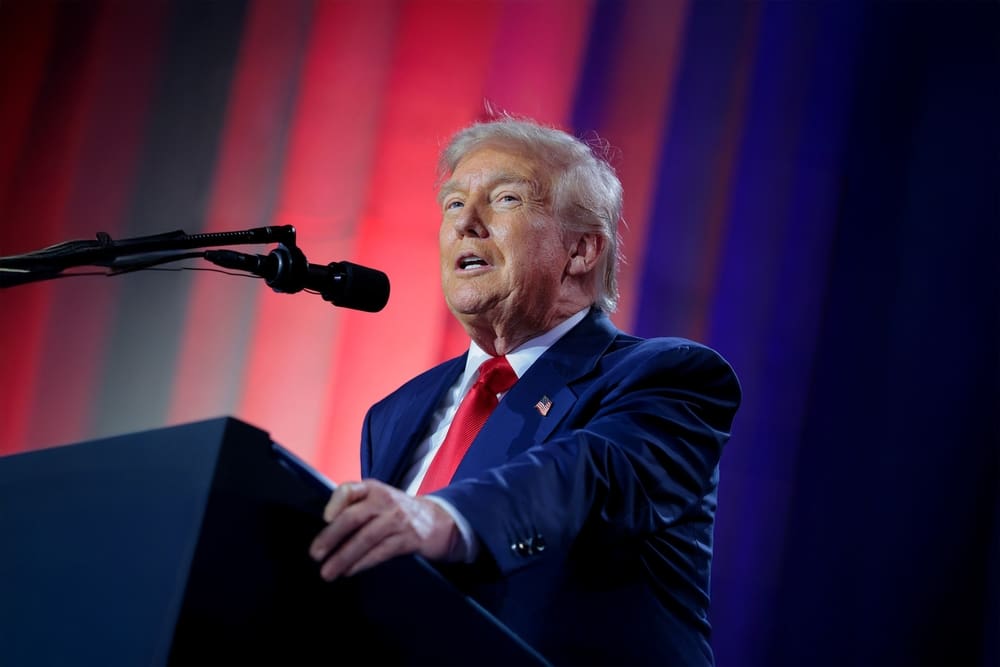Executive Summary
The Story So Far
Why This Matters
Who Thinks What?
President Donald Trump utilized the memorial service for the late Charlie Kirk in Arizona on Sunday to unequivocally signal his intent to intensify his confrontational political approach, explicitly rejecting calls for national unity and forgiveness in the wake of Kirk’s assassination. While the service also served as a moment for reflection on the future of the Make America Great Again (MAGA) movement, Trump’s remarks underscored his commitment to a divisive strategy, stating, “I hate my opponent.”
Trump Reaffirms Confrontational Approach
During a remarkable hours-long eulogy for the Turning Point USA founder, Trump diverged from his prepared remarks to assert his political philosophy. He praised Kirk as “a missionary with a noble spirit and a great, great purpose” who “did not hate his opponents.” However, Trump then interjected, “That’s where I disagreed with Charlie. I hate my opponent. And I don’t want the best for them.”
Trump’s tone starkly contrasted with much of the memorial service, including the astonishing moment when Kirk’s widow, Erika Kirk, publicly forgave his killer. While Trump’s frankness might have disappointed some, it was not surprising given his consistent conduct over the past decade.
The President used the platform to issue fresh warnings of crackdowns on “radical” left-wing groups he accuses of fomenting violence. He also lashed out at the media and progressives, reiterated promises for crime crackdowns, and repeated his false claims about the 2020 election. His top policy adviser, Stephen Miller, delivered an equally bleak speech.
Glimpse into MAGA’s Post-Kirk Future
Beyond Trump’s assertive message, Kirk’s memorial offered a fascinating look into the potential evolution of the MAGA movement and modern conservatism. It hinted at how the movement might adapt after President Trump eventually leaves the political stage and how Kirk’s skill in broadening the conservative coalition will be missed.
Emerging Leaders and Shifting Dynamics
Two eulogists, Vice President JD Vance and Secretary of State Marco Rubio, appeared acutely aware of the political moment. Both offered tributes marked by humanity and generosity, providing public testimonies to their Christian faith. This intensifying religiosity, particularly among male GOP voters, suggested the outlines of a possible 2028 Republican presidential race in their speeches.
Vance credited Kirk with elevating him to the vice presidency, declaring, “For Charlie, we will rebuild this United States of America to greatness. For Charlie, we will never shrink, we will never cower, and we will never falter, even when staring down the barrel of a gun.” Rubio, fusing traditional conservatism with a spiritual tone, stated, “He mattered. And he will matter more than he ever has before,” positioning Kirk as a guiding light for conservatism’s future.
Erika Kirk also emerged as a potential future figure within the conservative movement, bravely vowing to lead Turning Point USA in honor of her late husband. She emphasized the world’s need for “a group that will point young people away from the path of misery and sin,” promising that “every part of our work will become greater.”
Building a Broader Coalition
The event itself became a theatrical representation of the expanded coalition that contributed to Trump’s 2024 election victory. Susie Wiles, the White House chief of staff, lauded Kirk for engaging young people on liberal college campuses and making them feel a sense of belonging within the movement.
Notably, Health and Human Services Secretary Robert F. Kennedy Jr., who commands a distinct appeal among certain voters, credited Kirk with facilitating his connection to President Trump. His presence at the service, given his Democratic family lineage, underscored the country’s ongoing political transformation.
Uncertainties for the Movement Ahead
With Kirk’s passing, the MAGA movement and Turning Point USA face complex questions regarding leadership and outreach. If Kirk was as valuable as many speakers indicated in drawing new voters, particularly younger demographics, a clear successor will be needed, especially for the less-engaged 2026 midterm elections.
President Trump’s confrontational speech also highlighted a broader conundrum: whether Americans would ultimately prefer the respectful political debate Kirk was eulogized for, over the President’s deepening authoritarianism. While Kirk held orthodox MAGA positions and engaged in inflammatory rhetoric, he was also skilled at engaging new constituencies and bridging divides.
At the close of his eulogy, Vice President Vance stated, “You ran a good race, my friend. I love you. We have got it from here.” The veracity of that final assertion will significantly influence the trajectory of American politics.








